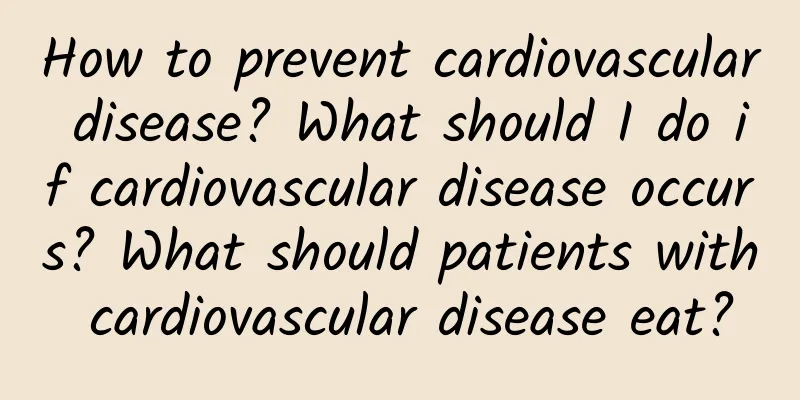How to prevent cardiovascular disease? What should I do if cardiovascular disease occurs? What should patients with cardiovascular disease eat?

|
How to prevent cardiovascular disease? △Wang Jianan, academician of the Chinese Academy of Sciences and chief physician of the Second Affiliated Hospital of Zhejiang University School of Medicine The cold winter season is the peak season for patients with cardiovascular diseases. The reasons for the increase in the incidence of cardiovascular diseases in winter are mainly related to temperature changes, lifestyle and physiological changes. First, when the temperature drops sharply, the human body will contract blood vessels in order to maintain body temperature, resulting in increased blood pressure and increased heart load; at the same time, cold weather makes people more inclined to stay indoors, and outdoor activities are relatively reduced, which may lead to weight gain and increased blood lipid levels, which are risk factors for cardiovascular diseases; in addition, winter is the peak season for respiratory diseases such as colds and flu, which will also indirectly affect the health of the cardiovascular system. In order to prevent cardiovascular diseases, we recommend: first, keep the room warm and keep warm when going out; second, increase indoor exercise appropriately to maintain blood circulation; third, increase warm-up activities before exercise; fourth, quit smoking and limit alcohol to reduce unnecessary stimulation to the cardiovascular system; fifth, choose low-salt, low-fat, high-fiber foods in your diet and avoid excessive intake of high-calorie foods; sixth, maintain a regular work and rest schedule and ensure adequate sleep. What should I do if I have a cardiovascular disease attack? △Wang Jianan, academician of the Chinese Academy of Sciences and chief physician of the Second Affiliated Hospital of Zhejiang University School of Medicine For patients who already have cardiovascular disease, special attention should be paid to keeping warm during the winter solstice to avoid blood pressure fluctuations caused by the cold, which may stimulate the cardiovascular system. Especially for patients with three highs, they should take medicine on time, monitor blood pressure, blood sugar, blood lipids and other indicators, maintain a stable mood and avoid overwork. Typical warning signs of cardiovascular disease include chest pain, chest tightness, palpitations, and dyspnea. At the same time, attention should also be paid to some atypical symptoms, such as nausea, vomiting, coughing, sweating, fatigue, shoulder, neck and arm pain, toothache, etc., which may be physical manifestations of cardiovascular symptoms. When a cardiovascular emergency occurs, the following first aid measures should be taken immediately: First, let the patient lie down and avoid excessive activity; second, call 120 emergency number immediately to seek professional help; third, if the patient has first aid drugs for the treatment of cardiovascular disease, they should be used under professional guidance; fourth, perform cardiopulmonary resuscitation in time: while waiting for the ambulance to arrive, monitor blood pressure, heart rate, breathing, etc., perform effective chest compressions and artificial respiration, maintain the patient's blood circulation and oxygen supply, and strive for more "golden time" for first aid. How should patients with cardiovascular disease eat? △Wang Jianan, academician of the Chinese Academy of Sciences and chief physician of the Second Affiliated Hospital of Zhejiang University School of Medicine Dietary management of patients with cardiovascular disease is crucial for the control and recovery of the disease. Patients should follow the "three lows" diet principle of low salt, low fat and low sugar, reduce the intake of high cholesterol foods, and increase fresh vegetables, fruits and whole grains rich in dietary fiber. The diet should be light, and avoid excessive seasoning and fried foods. For patients with cardiovascular disease, quitting smoking and limiting alcohol consumption is very necessary, because smoking and drinking will increase the burden on the heart and aggravate the condition. At the same time, attention should be paid to adjusting the diet structure to ensure balanced nutrition. It is recommended to develop a personalized diet plan under the guidance of a professional nutritionist, and develop a suitable diet plan according to the patient's specific condition, physical condition and nutritional needs to help control the disease and promote health. For patients who have already implanted vascular stents or heart failure, it is necessary to pay attention to cardiovascular rehabilitation training to improve heart health. Finally, I will give you a cardiovascular health formula-"reasonable diet, quit smoking and limit alcohol, and moderate exercise." |
<<: Popular Science | Artificial Intelligence Development and Biomedical Innovation
>>: How can operating room nursing and anesthesiologist become good partners?
Recommend
Is it normal to feel the fetus moving in early pregnancy?
It is normal to experience fetal movement during ...
How to treat vulvar itching ulcers
Women's bodies are most susceptible to bacter...
There are many benefits to eating durian, but don't be greedy
Durian is a fruit with great nutritional value, b...
How many days does it take to induce labor and stay in confinement?
Induced abortion is a measure taken by women to r...
How long can I have sex after using Sophora flavescens
Sophora flavescens gel is a medicine used for gyn...
What should women with qi deficiency eat?
Qi deficiency is a term used in traditional Chine...
How to completely treat mold
Clinically, many bacteria will have an impact on ...
How to solve the problem of delayed menstruation due to strenuous exercise
Many athletes may experience delayed menstruation...
If diarrhea and constipation occur alternately, be alert to proctitis!
Author: Fan Xueshun, Chief Physician of China-Jap...
Normal value of uterine artery
When a woman is pregnant, her uterus will be open...
What is the incubation period for pubic lice?
Pubic lice often has a great impact on the life o...
Is endometrial thickening serious?
Is endometrial thickening serious? Generally spea...
What is green and low-carbon life? What are the ways to live a green and low-carbon life?
Low-carbon and green means that the energy consum...
Can Teddy dogs eat egg yolks every day? How to make egg yolks for dogs
Egg yolks are rich in nutritional value. For dogs...
Gynecological fluid dressing
Clinically, many women have some gynecological di...









